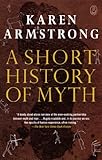A short history of myth / Karen Armstrong.
Material type: TextLanguage: English Publication details: Edinburgh ; New York : Canongate, 2005.Description: 159 p. ; 20 cmISBN:
TextLanguage: English Publication details: Edinburgh ; New York : Canongate, 2005.Description: 159 p. ; 20 cmISBN: - 184195800X (pbk.)
- 9781841958002 (pbk.)
- 201/.309
- BL 312 A736s 2005
| Item type | Current library | Home library | Collection | Shelving location | Call number | Copy number | Status | Date due | Barcode |
|---|---|---|---|---|---|---|---|---|---|
 Libro
Libro
|
Biblioteca Juan Bosch | Biblioteca Juan Bosch | Humanidades | Humanidades (4to. Piso) | BL 312 A736s 2005 (Browse shelf(Opens below)) | 1 | Available | 00000061066 |
Includes bibliographical references (p. 157-165).
What is a myth? -- Palaeolithic Period : Mythology of the hunters (c. 20000 to 8000 BCE) -- Neolithic Period : Mythology of the farmers (c. 8000 to 4000 BCD) -- Early civilisations (c. 4000 to 800 BCE) -- Axial Age (c. 800 to 200 BCE) -- Post-Axial Period (c. 200 BCE to c. 1500 CE) -- Great Western Transformation (c. 1500 to 2000).
Human beings have always been mythmakers. Theologian Armstrong here investigates myth: what it is, how it has evolved, and why we still so desperately need it. She takes us from the Paleolithic period and the myths of the hunters, up to the Great Western Transformation of the last five hundred years and the discrediting of myth by science. The history of myth is the history of humanity, our stories and beliefs, our curiosity and attempts to understand the world, which link us to our ancestors and each other--From publisher description.


There are no comments on this title.